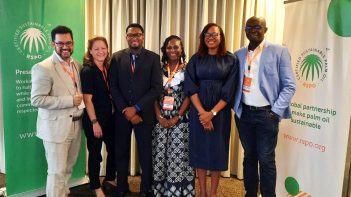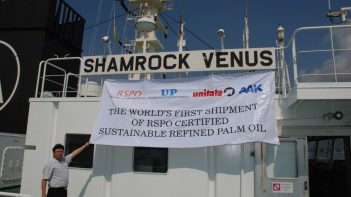The Roundtable on Sustainable Palm Oil (RSPO) was recently granted the ‘Special Consultative Status’ with the United Nations Economic and Social Council (ECOSOC), which is among the key components of the United Nations (UN) that oversees issues related to economic and social development. The Consultative Status, which took effect in May 2014, will enable RSPO to actively engage with the UN Secretariat, ECOSOC and its subsidiary bodies.
According to Darrel Webber, Secretary General of RSPO, “We are grateful to the United Nations, ECOSOC in particular, for recognizing our expertise and providing us with the opportunity to contribute towards its global efforts and goals. We certainly look forward to being instrumental in supporting ECOSOC by spearheading discussions and advising them on matters pertaining to sustainable agriculture and commodities”.
He further added, “RSPO will most certainly benefit as well from this opportunity as we now have the platform and channel that will allow our presence to be felt and voices to be heard. We hope this will help us in our journey to transform markets to make sustainable palm oil the norm”.
With its newly attained Special Consultative Status, RSPO can consult as well as actively participate in the work of the UN Council aside from being able to confer with UN member states.
RSPO, as subject matter experts on sustainable agriculture and commodities, can be referred to by the UN Council or any of its affiliates aside from being able to submit written statements relevant to the work of the UN Council, which may be circulated among members of the UN Council by the UN Secretary General.
RSPO is also entitled to designate official representatives to the UN headquarters and offices and may sit in as observers at the UN council public meetings, the UN General Assembly, Human Rights Council and other inter-governmental decision-making bodies.
Notes to editor:
18% of world's palm oil production is now RSPO certified
The current estimated annual production capacity of RSPO-certified sustainable palm oil is 11.1 million metric tons, approximately 18% of global crude palm oil. Spread over 1.98 million hectares of certified production area, about 49.6% of the world's current RSPO-certified sustainable palm oil production capacity comes from Indonesia, followed by 40.6% from Malaysia, 5.6% from Papua New Guinea and the remaining 4.2% from Solomon Islands, Ivory Coast, Thailand, Guatemala, Ecuador, Brazil, Cambodia and Colombia.
About RSPO
In response to the urgent and pressing global call for sustainably-produced palm oil, the Roundtable on Sustainable Palm Oil (RSPO) was formed in 2004 with the objective of promoting the growth and use of sustainable oil palm products through credible global standards and engagement of stakeholders. The seat of the association is in Zurich, Switzerland, while the secretariat is currently based in Kuala Lumpur with a satellite office in Jakarta.
RSPO is a not-for-profit association that unites stakeholders from seven sectors of the palm oil industry – oil palm producers, palm oil processors or traders, consumer goods manufacturers, retailers, banks and investors, environmental or nature conservation NGOs and social or developmental NGOs – to develop and implement global standards for sustainable palm oil.
Such multi-stakeholder representation is mirrored in the governance structure of RSPO such that seats in the Executive Board and project-level Working Groups are fairly allocated to each sector. In this way, RSPO lives out the philosophy of the "roundtable" by giving equal rights to each stakeholder group to bring group-specific agendas to the roundtable, facilitating traditionally adversarial stakeholders and business competitors to work together towards a common objective and make decisions by consensus.
For further information, kindly contact:
Contact for RSPO Secretariat:
Stefano Savi
Acting Communications Director
T: +603 2302 1500
Keep reading

RSPO hosts first Africa downstream sustainable palm oil supply chain forum in Cape Town

Nearly two decades on, Europe continues to drive global demand for RSPO Certified Palm Oil

Communicating Sustainable Palm Oil - examples of success across Europe
[EOT] Terms of Reference: Independent Smallholders Outreach Programme in Indonesia

RT2023 Delegates Propose Solutions to Reinforce RSPO’s Assurance System – End-Year Highlights of Assurance Standing Committee
RSPO UK Members' Day Examines Shifting Dynamics of Doing Business within Europe

Celebrating 20 Years of RSPO’s Sustainability Journey




